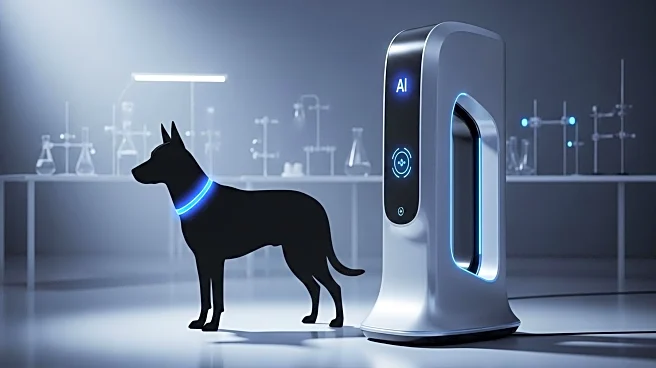What is the story about?
What's Happening?
SpotitEarly, a biotech company, is pioneering a novel approach to cancer detection by combining canine olfactory skills with artificial intelligence. The company has developed an at-home cancer test that analyzes human breath samples using trained dogs and AI technology. This method has demonstrated a 94% accuracy rate in detecting early-stage cancers, including breast, colorectal, prostate, and lung cancers, according to research published in Nature's Scientific Reports. SpotitEarly, founded in Israel in 2020, has recently launched into the U.S. market with $20.3 million in funding from various investors. The company plans to expand its clinical studies and make its screening kits available through a network of physicians next year.
Why It's Important?
The introduction of SpotitEarly's innovative cancer detection method could significantly impact the U.S. healthcare industry by providing a more accessible and affordable option for early cancer screening. With the potential to detect cancer at an early stage, this technology could lead to better patient outcomes and reduce healthcare costs associated with late-stage cancer treatments. The company's approach also highlights the growing intersection of biotechnology and artificial intelligence in medical diagnostics, potentially paving the way for further advancements in non-invasive testing methods. As SpotitEarly aims to price its tests competitively, it could challenge existing market players and drive innovation in cancer detection technologies.
What's Next?
SpotitEarly plans to use its recent funding to expand clinical studies, initially focusing on breast cancer detection before addressing other targeted cancers. The company intends to make its at-home screening kits available to consumers through a network of physicians by next year, with pricing set to be competitive against existing options like Grail's Galleri test. As the company moves forward, it may face regulatory challenges, particularly concerning FDA approval for its testing method. Additionally, SpotitEarly's success could prompt other biotech firms to explore similar technologies, potentially leading to increased competition and further innovation in the field of cancer detection.
Beyond the Headlines
SpotitEarly's approach raises ethical and cultural considerations regarding the use of animals in medical testing. The company emphasizes the well-being of its canine team, ensuring they are treated as integral members rather than mere biosensors. This focus on animal welfare could influence public perception and acceptance of the technology. Furthermore, the integration of AI in healthcare continues to spark discussions about data privacy and the accuracy of machine learning models in medical diagnostics. As SpotitEarly's technology gains traction, it may contribute to broader conversations about the role of AI in healthcare and the ethical implications of its use.
















